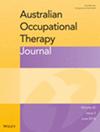Peer-mentorship among people with lower limb amputations living in small communities
Abstract
Introduction
Peer-mentorship, when a peer shares a connection to a group provides knowledge, empathy, and validation through the unique perspective of their lived experience of practical and social–emotional knowledge following disease or disability. However, there is a paucity of research on peer-mentorship among individuals with lower limb amputations particularly those who live in small communities. This study aimed to investigate peer-mentorship among individuals with lower limb amputations in small communities during pre-amputation procedures and adjustment to life post-amputation.
Methods
Qualitative description, semi-structured telephone interviews were conducted with peer-mentors or mentees who experienced lower limb amputation in a small community.
Consumer and community involvement
One member of the research team was a person with lived experience, and another member of the research team was a clinician (orthopaedic surgeon). Both team members contributed to the study concept, design and analysis of the data and have read and approved the final manuscript. The team member with lived experience additionally supported participant recruitment.
Results
Four themes emerged: ‘satisfying an unmet need’ explores the desire to learn from others who have similar experiences living with lower limb amputation; ‘improving independence’ describes the unique guidance offered by peer-mentors for returning to daily activities; ‘friendship’ considers peer-mentors' therapeutic delivery including its long-lasting guidance and connection; ‘advocating for support and resources’ examines how peer-mentors fulfil supportive roles such as health-care navigation.
Conclusion
Results demonstrate peer-mentorship's role in improving independence and social support and providing advocacy during adjustment to lower limb amputation among people residing in small communities.
PLAIN LANGUAGE SUMMARY
People who have had their leg amputated need support programs. This is very true for people living in small communities. In this study, we talked to people who have had a leg amputated and who live in a small community. We wanted to know their thoughts about peer-support. Peer-support is when someone who has a leg amputation provides support to others who also have a leg amputation. We asked people: How did peer-support help you get ready for your amputation? How did peer-support help you after your amputation? People said that peers provided education and advice. People also talked about peers being a friend. Overall, peer-support was helpful.

 求助内容:
求助内容: 应助结果提醒方式:
应助结果提醒方式:


